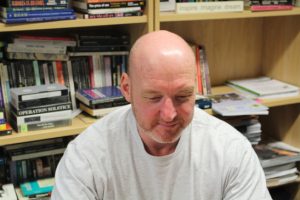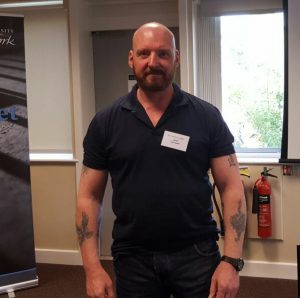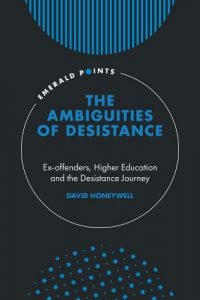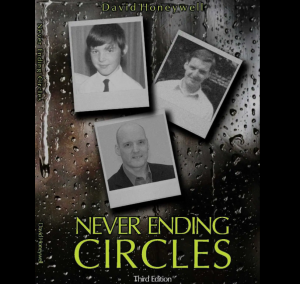The indelible stain of lived experience
Written by David Honeywell, Co-Investigator, PROSPECT project
Writing this reflective piece fills me with sadness as I come to the end of what has been a fun yet challenging two years working with the most supportive and driven group of individuals I have had the privilege to work with.
 My time as a full-time peer researcher on the PROSPECT study has sadly come to a rather abrupt end and purely because of an outdated, draconian criminal justice system that still fails to sufficiently acknowledge rehabilitation.
My time as a full-time peer researcher on the PROSPECT study has sadly come to a rather abrupt end and purely because of an outdated, draconian criminal justice system that still fails to sufficiently acknowledge rehabilitation.
In 2019, I was privileged to become a co-investigator and peer researcher at the University of Manchester to work on a 4-year NHS funded project developing a talking therapy for suicidal prisoners. It also gave me the opportunity as a former prisoner turned academic to give something back by going into prison as a researcher and helping other prisoners and prison staff.
As part of the funding application process, the sponsors insisted that someone with ‘lived experience’ be recruited as this gives authenticity from a novel insight which acts a voice for others who have also been in that position. It provides a formal platform for those whose voices in the past have been muted by the establishment.
Therefore, in recent years there has been movement by medical and psychological research sponsors to insist on individuals with lived experience to be included in research studies. These individuals are referred to as service users or PPIs (Patient and Public Involvement) who are actively involved in research projects and research organisations.
Their identities are always anonymised, so it is unheard of for a service user to become a researcher themselves in a psychology based study without needing to be anonymised. I felt I’d arrived where education had opened doors for me I could never have imagined. The most ironic part was that out the four prisons in which we were to conduct our study one of them was where I served my last prison sentence and where I gained my university entrance qualifications.
I knew that gaining permission to work inside a prison long term for me could never be straightforward. Even before that stage, it was a worry whether I could even bypass the initial university recruitment process and be accepted into this prestigious institution. I was honoured when I crossed that bridge and I know this was in no small part due to the support from my line manager, Dan.
But there was still the next stage to gain access into prisons which will be the bane of my life forever because of the indelible stain it has put on my character. DBS checks was the initial stage of our prison vetting process which unfortunately but not unexpectedly led to my application to work in prison being rejected. The day we all received the generic email from the prison which listed everyone’s initial vetting outcome left me feeling completely deflated. Although I expected this, seeing ‘rejected’ next my name on the list invoked past feelings of rejection by employers, colleges and members of society. Higher Education has enabled me to rise above all these in the past but now it became a catch 22 situation where although I was employed by the university, I was unable to fulfil my role as a prison researcher.
There was some hope though when one of the prison governors appealed against this decision on my behalf four times. I had always believed prison governors could overrule vetting rejections, but it wasn’t to be. It transpired that the prison governor also needed permission from the Ministry of Justice and it was here everything came to an abrupt halt for reasons I will never know.
Eventually, after two years of waiting for this decision to be overturned and being no further forward, I decided it was time to move on rather than allow the establishment to continue punishing me.
Apart from being reflective, the key message that I want to get across here is that there needs to be a change in the vetting procedure for individuals in my position. If sponsors are going to insist on psychological projects including service users then there needs to be a huge shakeup in how the vetting process is to be conducted. If sponsors are to insist on service user involvement, then there must be more transparency and assistance on making this happen.
Fortunately, not all is lost because as a co-investigator, I still get to be part of the study in a more consultancy role. I will remain very much a part of the lives of my colleagues, and we will continue to work together on what is to be not only ground breaking but essential to the mental health and well-being of both prisoners and prison staff, as well as helping to reduce the epidemic proportions of prison suicide.
About Dr Dave Honeywell:

Dr Dave Honeywell
Dr David Honeywell has recently begun lecturing in Criminology at the Arden University. He is a Co-Investigator on the PROSPECT project, and previously worked as a Lived Experience Research Assistant at the University of Manchester. David began his academic career in 2013 at the University of York where he worked as an Associate Criminology Lecturer alongside studying for a PhD. He has since taught criminology at Leeds Beckett University and the universities of Durham and Hull. In 2018, he completed his PhD in sociology about ex-prisoners and the transformation of self through higher education which was inspired by his own personal journey as an ex- prisoner who escaped a dysfunctional life through learning. While in prison in the 1990’s he gained an Open University qualification which later led to degrees in criminology, social research methods and sociology. After a 10-year break from study he returned to university following the publication of his autobiography Never Ending Circles which was inspired by the aftermath of the 2011 London riots. His book led to an ongoing career as a guest speaker and visiting lecturer on the university circuit.
David has recently published a monograph ‘The Ambiguities of Desistance’ from his PhD study. Further details can be found here: https://books.emeraldinsight.com/page/detail/The-Ambiguities-of-Desistance/?k=9781839827877

Dave has previously written about his life experiences, from childhood to prison and through to higher education, in his autobiography, ‘Never Ending Circles’.

